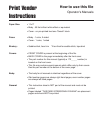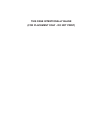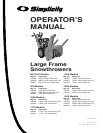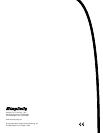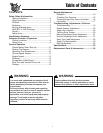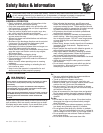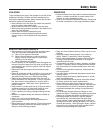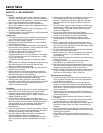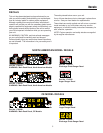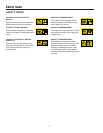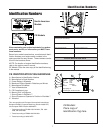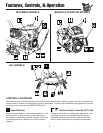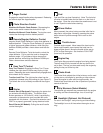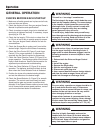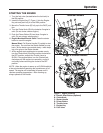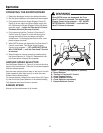
Safety Rules
3
CHILDREN
Tragic accidents can occur if the operator is not alert to the
presence of children. Children are often attracted to the
unit and the operating activity. Never assume that children
will remain where you last saw them.
• Keep children out of the area and under the watchful
care of another responsible adult.
• Be alert and turn unit off if children enter the area.
• Before and during reverse operation, look behind and
down for small children.
• Never allow children to operate the unit.
• Use extra care when approaching blind corners,
shrubs, trees, or other objects that may obscure
vision.
EMISSIONS
• Engine exhaust from this product contains chemicals
known, in certain quantities, to cause cancer, birth
defects, or other reproductive harm.
• Look for the relevant Emissions Durability Period and
Air Index information on the engine emissions label.
SERVICE AND MAINTENANCE
• Use extra care in handling gasoline and other fuels.
They are flammable and vapors are explosive.
a) Use only an approved container.
b) Never remove gas cap or add fuel with the
engine running. Allow engine to cool before
refueling. Do not smoke.
c) Never refuel the unit indoors.
• If fuel is spilled, do not attempt to start the engine but
move the machine away from the area of spillage and
avoid creating any source of ignition until fuel vapors
have dissipated.
• Replace all fuel tank caps and fuel container caps
securely.
• Never fill containers inside a vehicle or on a truck bed
with a plastic bed liner. Always place containers on
the ground away from your vehicle before filling.
• Remove gas-powered equipment from the truck or
trailer and refuel it on the ground. If this is not possi-
ble, then refuel such equipment on a trailer with a
portable container, rather than from a gasoline dis-
penser nozzle.
• Keep nozzle in contact with the rim of the fuel tank or
container opening at all times until fueling is com-
plete. Do not use a nozzle lock-open device.
• If fuel is spilled on clothing, change clothing immedi-
ately.
• Maintain or replace safety and instruction labels as
necessary.
• Never run a unit in an enclosed area.
• Keep nuts and bolts tight and keep equipment in
good condition.
• Never tamper with safety devices. Check their proper
operation regularly and make necessary repairs if
they are not functioning properly.
• Keep unit free of debris build-up. Clean up oil or fuel
spillage.
• Stop and inspect the equipment if you strike an
object. Repair, if necessary, before restarting.
• Never make adjustments or repairs with the engine
running unless specified otherwise in the engine
manufacturer’s manual.
• Components are subject to wear, damage, and dete-
rioration. Frequently check components and replace
with manufacturer’s recommended parts, when nec-
essary.
• Check control operation frequently. Adjust and ser-
vice as required.
• Use only factory authorized replacement parts when
making repairs.
• Always comply with factory specifications on all set-
tings and adjustments.
• Only authorized service locations should be utilized
for major service and repair requirements.
• Never attempt to make major repairs on this unit
unless you have been properly trained. Improper ser-
vice procedures can result in hazardous operation,
equipment damage and voiding of manufacturer’s
warranty.
• Do not change engine governor settings or over-
speed the engine. Operating the engine at excessive
speed can increase the hazard of personal injury.
• Disengage auger and traction, stop the engine,
remove the key, and disconnect the spark plug
wire(s) before: clearing blockages and chutes, per-
forming service work, striking an object, or if the unit
vibrates abnormally. After striking an object, inspect
the machine for damage and make repairs before
restarting and operating the equipment.



